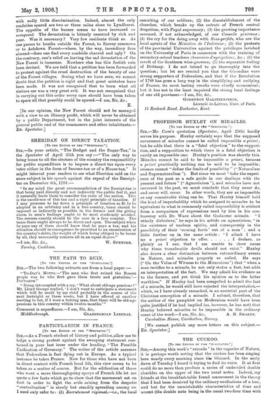PROFESSOR HTJXLEY ON MIRACLES.
[To THE EDITOR OF " SPECTATOP 'i
SIR,—Mr. Cave's quotation (Spectator, April 25th) hardly serves his purpose. Huxley certainly says that the supposed occurrence of miracles cannot be called impossible a priori; but he adds that there is a "fatal objection" to the supposi- tion, and a supposition to which there is a fatal objection is surely an impossible one. Huxley's position was shortly this. Miracles cannot be said to be impossible a priori, because a priori practically nothing can be said to be impossible; science cannot "define the limits of possibility" (" Naturalism and Supernaturalism "). But since we must "take the experi. ence of the past as a safe guide in our dealings with the present and future" (" Agnosticism "), and miracles have not occurred in the past, we must conclude that they never do, and never will, occur. In other words, they are as impossible as any conceivable thing can be. That Huxley himself held the kind of improbability which he assigned to miracles to be equivalent to what is commonly called impossibility is evident from a comparison of expressions used by him in his con- troversy with Dr. Wace about the Gadarene miracle. "I utterly disbelieve," he says in his article on agnosticism, "in the existence of unclean spirits, and consequently in the possibility of their 'coming forth' out of a man " ; and a little further on in the same article : "I admit I have no a priori objection to offer deelare, as plainly as I can, that I am unable to show cause why these transferable devils should not exist." Huxley also draws a clear distinction between extraordinary events in Nature, and miracles properly so called. He says (" On the Value of Witness to the Miraculous") that "when a man testifies to a miracle, he not only states a feet,- but adds an interpretation of the fact. We may admit his evidence as to the former, and yet think his opinion as to the latter worthless." If Huxley had been compelled to admit the fact of a miracle, he would still have rejected the interpretation,— which, as I have already remarked, is an essential part of the Christian conception of a miracle. I submit, therefore, that the author of the pamphlet on Modernism would have been quite justified if he had implied (as, however, he has not) that Huxley believed miracles to be impossible in the ordinary [We cannot publish any more letters on this subject. — ED. Spectator.]








































 Previous page
Previous page